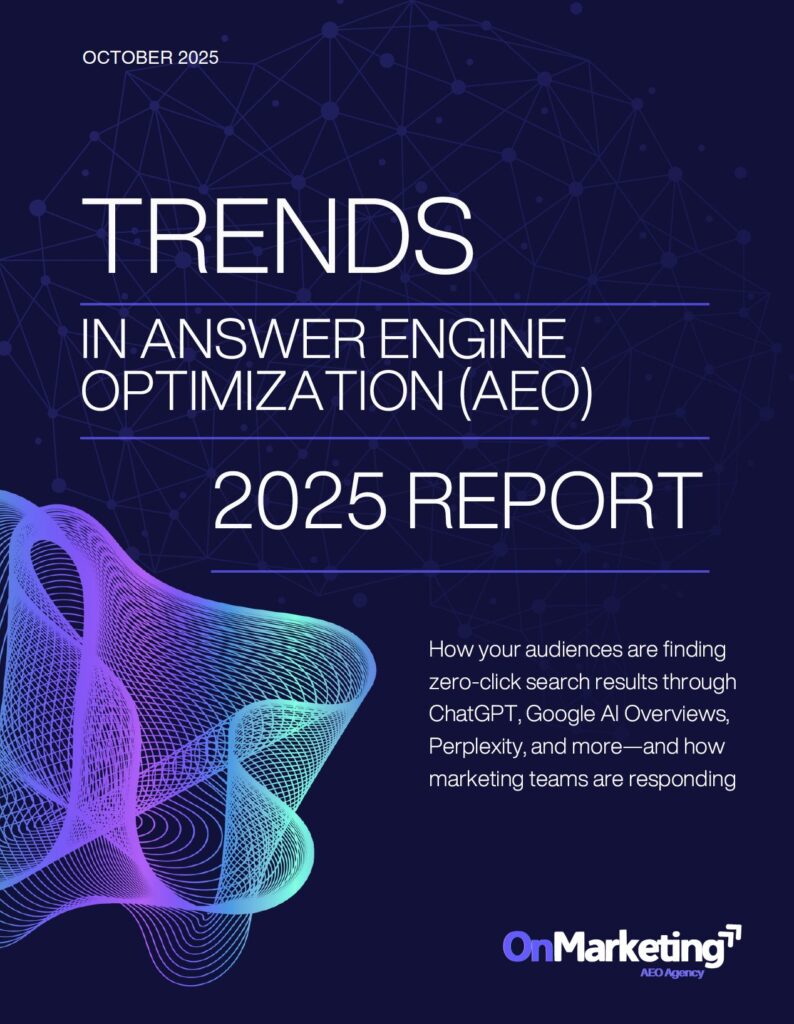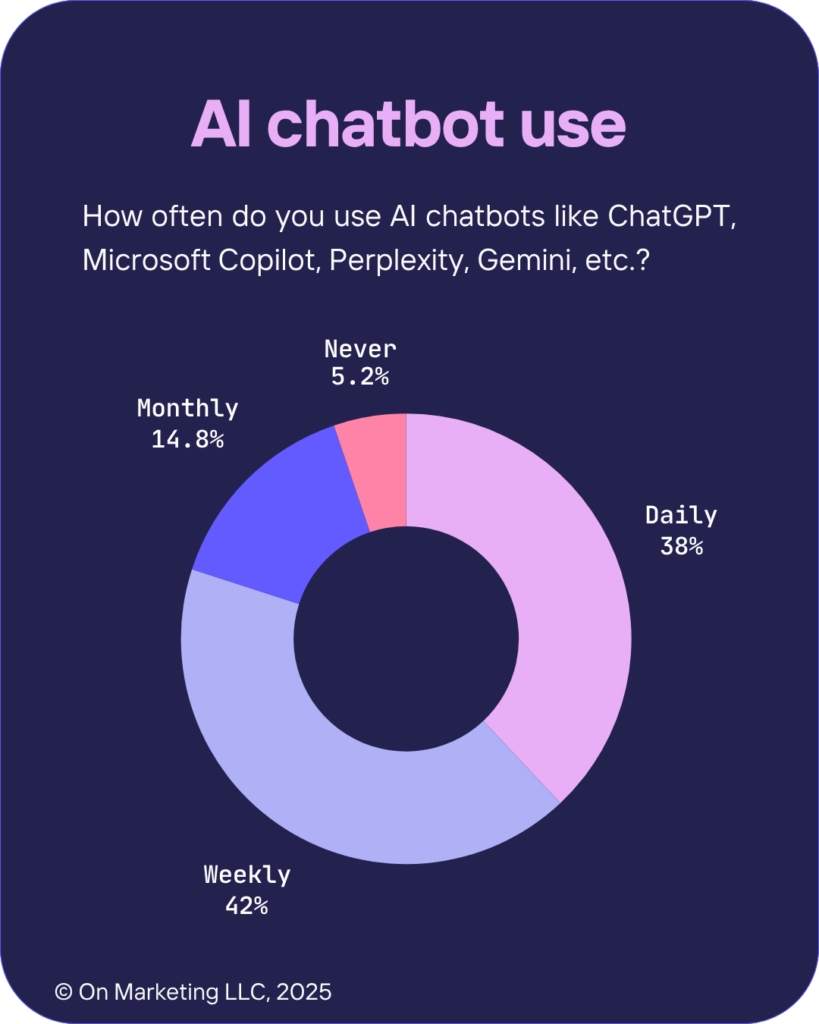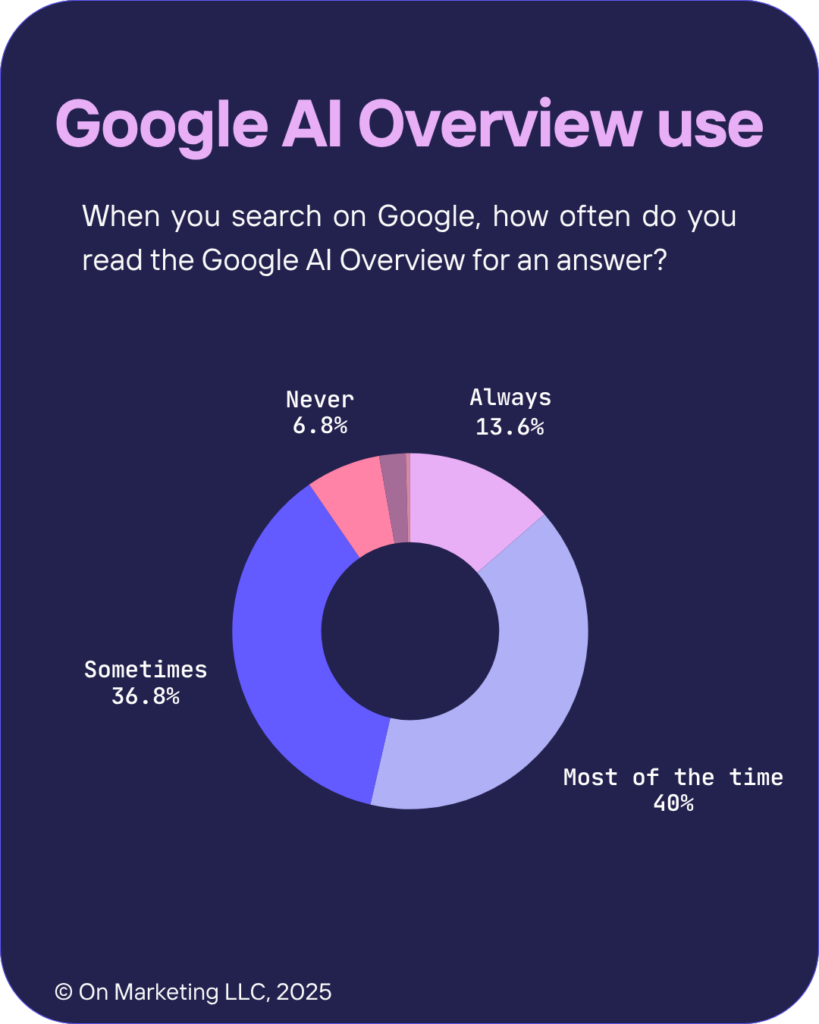AEO Report: Trends in Answer Engine Optimization 2025
Survey results on AI SEO trends
Whether for personal or business use, more people are using AI-powered search engines and chatbots to get answers to their questions—and marketing teams are responding with strategies to maximize their brand visibility.
AI search trends
Learn how your audiences are finding zero-click search results through ChatGPT, Google AI Overviews, Perplexity, and more.
Marketing trends in AI search optimization
Understand how marketing teams are adopting answer engine optimization (AEO) strategies.
Popular AEO strategies
Explore the AI SEO tactics marketing professionals are implementing in the next 18 months.

How often are people using ChatGPT?
We surveyed 250 people in the United States between the ages of 18-85 about whether and how they use AI chatbots like ChatGPT, Microsoft Copilot, Perplexity, and Gemini. Survey responses were collected in September 2025.

38%
Use an AI chatbot daily
More than one-third of our survey respondents say they use ChatGPT or a similar AI chatbot daily.
80%
Use an AI chatbot weekly
4 out of 5 respondents say they use ChatGPT or another chatbot daily or weekly.
95%
Use an AI chatbot monthly
Among our survey respondents, 94.8% say they currently use an AI chatbot at least monthly.
5%
Never use AI chatbots
Only 5.2% of our survey respondents report that they never use an AI chatbot.
How often do people read Google AI Overviews?
Powered by the Gemini model, Google AI Overviews are AI-generated summaries that sometimes appear at the top of Google search results. In addition to providing a complete answer to a query, AI Overviews also include links to sources, which users can follow if they want more information.
14%
Always read
More than 1 in 7 (13.6%) of our survey respondents say they always read Google AI Overviews when overviews are provided.
54%
Read most of the time
A total of 54% of our respondents read Google AI Overviews most of the time (40%) or always (13.6%).
90%
Read at least sometimes
A total of 90.4% of our respondents read Google AI Overviews at least sometimes (36.8%), most of the time (40%), or always (13.6%).
7%
Never read
6.8% of our respondents say they receive AI Overviews but ignore them. About 2% don’t see AI Overviews in their Google search results, while 0.4% don’t know what AI Overviews are.

How are marketing teams optimizing for AI search and LLMs?
On Marketing asked 250 marketing professionals based in the United States about how their teams are adopting strategies to optimize content for AI search engines and chatbots, like Google AI Overviews, ChatGPT, Perplexity, and Microsoft Copilot. Survey responses were collected in September 2025.
37%
Are optimizing for AI search
According to the professionals we surveyed, 37.2% of marketing teams are already actively optimizing their website or content for AI search.
76%
Are monitoring ChatGPT
Marketing teams are checking AI chatbots and search tools for how their brands show up, with 76.4% of respondents monitoring ChatGPT, by far the most popular platform.
80%
Have already launched or will implement AEO in the next year
While some teams have already launched AI search optimization strategies, more than 26% plan to implement them in the next six months, and about 23% plan to within 12 months.
52%
Are optimizing website content
More than half (52.4%) of the marketing professionals we surveyed are already optimizing their websites for search, a critical part of AI search and LLM optimization strategies.
Is it AI SEO, GEO, LLMO, or AEO?
The majority of marketers (83.6%) recognize the term u003cstrongu003eAI search engine optimizationu003c/strongu003e, or u003cstrongu003eAI SEOu003c/strongu003e. More than a third recognize the term u003cstrongu003egenerative engine optimizationu003c/strongu003e, or u003cstrongu003eGEOu003c/strongu003e, (38.8%) and the more technical u003cstrongu003eLLM optimizationu003c/strongu003e or u003cstrongu003eLLMOu003c/strongu003e, (37.6%) which refers to the large language models these AI search tools are based on. Fewer recognize u003cstrongu003eanswer engine optimizationu003c/strongu003e, or u003cstrongu003eAEOu003c/strongu003e (19.6%). A small percentage of marketers aren’t familiar with any of these terms.
What percentage of marketing teams have adopted AI search optimization?
While most marketing professionals in our survey recognize the practice of AI search optimization, most say their teams have not implemented any strategies or are unsure if their existing strategies are sufficient. However, at least a third are already optimizing for AI search.u003cbru003eu003cbru003eAccording to our survey respondents, u003cstrongu003e37.2%u003c/strongu003e of marketing teams are actively optimizing their website or content for AI search. u003cstrongu003e30.8%u003c/strongu003e have not yet implemented any strategies, but are exploring how to optimize for AI search. u003cstrongu003e16.8%u003c/strongu003e have optimized for SEO and assume that will help with AI search. u003cstrongu003e10%u003c/strongu003e have not optimized for AI search and don’t have any plans to do so. u003cstrongu003e5.2%u003c/strongu003e are not familiar with AI search optimization.
What AI platforms or LLMs are marketing teams monitoring?
Even if they don’t already have a fully developed AI search optimization strategy, many marketing teams are already monitoring for brand or content visibility in AI platforms. u003cbru003eu003cbru003eThe most popular platform is u003cstrongu003eChatGPTu003c/strongu003e, which u003cstrongu003e76.4%u003c/strongu003e of survey respondents say they are monitoring. The next most popular platforms being monitored are u003cstrongu003eGoogle AI Overviewsu003c/strongu003e (u003cstrongu003e35.6%u003c/strongu003e), u003cstrongu003eMicrosoft Copilotu003c/strongu003e (u003cstrongu003e27.2%u003c/strongu003e), and u003cstrongu003eGoogle AI Modeu003c/strongu003e (u003cstrongu003e24.4%u003c/strongu003e). Fewer marketing teams are monitoring u003cstrongu003exAI Groku003c/strongu003e (u003cstrongu003e13.6%u003c/strongu003e) and u003cstrongu003ePerplexityu003c/strongu003e (u003cstrongu003e12%u003c/strongu003e). A minority (u003cstrongu003e6.8%u003c/strongu003e) are monitoring other AI platforms not listed.u003cbru003eu003cbru003eOne in 10 respondents say they are not monitoring their brand or content in any AI platform.
What is the typical timeline for implementing AI search optimization?
By optimizing for AI search sooner rather than later, marketing teams can gain an edge over their competition by winning visibility for their preferred search queries.u003cbru003eu003cbru003eIn our survey, an even u003cstrongu003e30%u003c/strongu003e of respondents say their teams are already optimizing for AI search. More than a quarter (u003cstrongu003e26.8%u003c/strongu003e) say they will start implementing their strategies within the next six months, and about another quarter (u003cstrongu003e23.2%u003c/strongu003e) plan to implement within the next 12 months. Fewer (u003cstrongu003e4.8%u003c/strongu003e) plan to implement within the next 18 months, while u003cstrongu003e15.2%u003c/strongu003e have no plans to implement AI search optimization strategies.
What AI SEO strategies are marketing teams adopting?
Even if they have not yet formally rolled out an AI SEO strategy, the majority of marketers we surveyed are already practicing some activities that are part of an AI search optimization program.u003cbru003eu003cbru003eMore than half (u003cstrongu003e52.4%u003c/strongu003e) are optimizing their websites for search, an activity that can be expanded to LLM optimization by using structured data or schema markup. Nearly half (u003cstrongu003e48%u003c/strongu003e) are mapping keywords and topics—a traditional SEO activity that plays a large role in AI search. Many (u003cstrongu003e42%u003c/strongu003e) are monitoring AI search visibility (by tracking query rankings or using brand visibility dashboards) and u003cstrongu003e29.6%u003c/strongu003e are producing thought leadership content to build authority (such as blog articles, reports, and guides).
